
Astor Pantaleón Piazzolla was an Argentine tango composer, bandoneon player, and arranger. His works revolutionized the traditional tango into a new style termed nuevo tango, incorporating elements from jazz and classical music. A virtuoso bandoneonist, he regularly performed his own compositions with a variety of ensembles. In 1992, American music critic Stephen Holden described Piazzolla as "the world's foremost composer of Tango music".

Tango is a style of music in 2
4 or 4
4 time that originated among European and African immigrant populations of Argentina and Uruguay. It is traditionally played on a solo guitar, guitar duo, or an ensemble, known as the orquesta típica, which includes at least two violins, flute, piano, double bass, and at least two bandoneóns. Sometimes guitars and a clarinet join the ensemble. Tango may be purely instrumental or may include a vocalist. Tango music and dance have become popular throughout the world.

Carlos Di Sarli was an Argentine tango musician, orchestra leader, composer and pianist.
Octavio Brunetti was a pianist, arranger and composer from Argentina. He was best known for his participation in the album Te amo tango by Raul Jaurena, which won the Latin Grammy Award for Best Tango Album in 2007, and was one of the most sought after tango pianists.
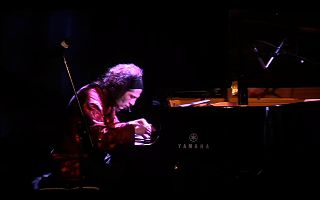
Fernando Otero is a Grammy-award-winning Argentine pianist, vocalist, and composer.

Libertango is a composition by tango composer and bandoneon player Astor Piazzolla, recorded and published in 1974 in Milan. The title is a portmanteau merging "Libertad" and "tango", symbolizing Piazzolla's break from classical tango to tango nuevo.
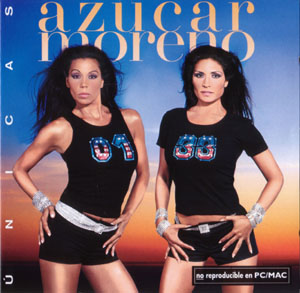
Únicas is the eleventh studio album by Spanish duo Azúcar Moreno, released on Sony International in 2002.
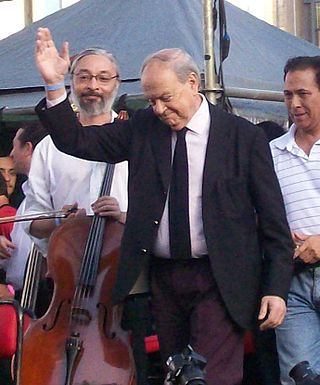
Atilio Stampone was an Argentine pianist, composer, and arranger prominent in the Tango genre.

Sin Daños a Terceros is the seventh studio album released on June 2, 1998, by Guatemalan singer-songwriter Ricardo Arjona.
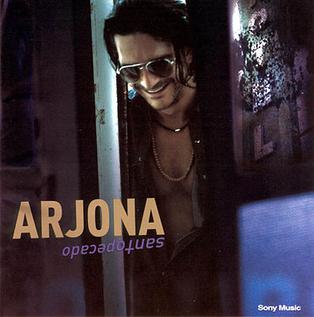
Santo Pecado is the ninth studio album recorded by Guatemalan singer-songwriter Ricardo Arjona. It was released by Sony BMG Latin on November 19, 2002 and was produced by Arjona, Carlos Cabral Jr. and Fernando Otero. The album earned nomination for Latin Grammy Award for Best Male Pop Vocal Album in the 4th Annual Latin Grammy Awards on September 3, 2003, losing by Quizás by Enrique Iglesias.
Piazzolla's Orquesta Típica, also known as the 1946 Orchestra, was a tango orchestra formed in 1946 in Buenos Aires by the Argentine bandoneon player Astor Piazzolla. This was Piazzolla's first orchestra of his own and from this spring board he would later go on to pioneer a new approach to the genre with his Octeto Buenos Aires.
Enrique Mario Francini was an Argentine tango orchestra director, composer and violinist who played in various tango ensembles including the Orquesta Francini-Pontier and Ástor Piazzolla's Octeto Buenos Aires.
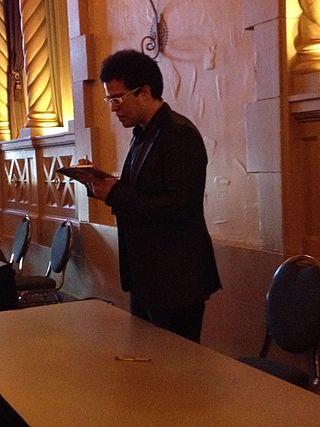
Juan Pablo Jofre is a Grammy nominated Argentinian musician, composer, and arranger. He plays the bandoneon.
Rodolfo Miguel Montironi is an Argentine bandoneonist, conductor, composer and arranger who has been involved in many tango orchestras in addition to his own.

Guido Antonio Santórsola di Bari Bruno was a Brazilian-Uruguayan composer, violinist, violist, viola d'amore player, and conductor of Italian birth.
Pagina de Buenos Aires is a piece by Argentine composer, pianist, and vocalist Fernando Otero, recorded in 2007 and released on his studio album Pagina de Buenos Aires on the Nonesuch label in 2008. The piece starts in the key of A minor and modulates twice, moving towards C minor and later to G minor. The version included in the album is shorter in comparison to live performances, with a duration of 4:07 minutes. The title of the piece "Pagina de Buenos Aires" means "Buenos Aires' story". It was based on Otero’s earlier composition "No Pudo Ser", written in Buenos Aires in 1993, of which he kept the melodic part and re-arranged the rest with some additions. It would prove to be one of Otero's most well-known and popular compositions, and it has been recorded by many artists using different arrangements and orchestrations.
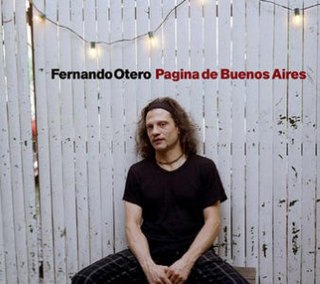
Pagina de Buenos Aires is an album by Argentine composer, pianist and vocalist Fernando Otero recorded in 2007 and released in 2008 on the Nonesuch label.

Vital is an album by Argentine pianist, vocalist and composer Fernando Otero, recorded in 2008 and released on the Harmonia Mundi's World Village label.

Tangos is a studio album by Panamanian musician Rubén Blades, it was released on June 24, 2014, through Sunnyside Records. The album consists of eleven new versions of compositions by Blades in the style of tango, it features produccion and arrangements by Argentine musician Carlos Franzetti and the participation of Leopoldo Federico's orquestra and the Prague Symphony Orchestra.

Mette Henriette is the debut double album by Norwegian saxophonist and composer Mette Henriette, released on ECM Records on October 16, 2015. It was the first debut double album to ever be released on the label.















